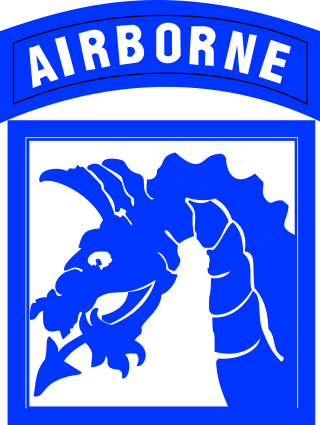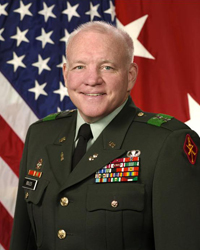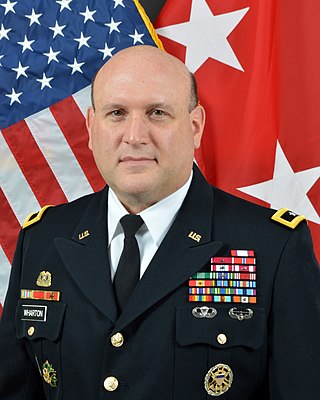
V Corps, formerly known as the Fifth Corps, is a regular corps of the United States Army at Fort Knox. It was previously active during World War I, World War II, the Cold War, the Kosovo War, and the War on Terrorism.

The 36th Infantry Division ("Arrowhead"), also known as the "Panther Division", "Lone Star Division", "The Texas Army", or the "T-patchers", is an infantry division of the United States Army and part of the Texas Army National Guard. It was organized during World War I from units of the Texas and Oklahoma National Guard. As an all-Texas unit, it was called for service for World War II 25 November 1940, was sent to the European Theater of Operations in April 1943, and returned to the Texas Army National Guard in December 1945.

The XVIII Airborne Corps is a corps of the United States Army that has been in existence since 1942 and saw extensive service during World War II. The corps is designed for rapid deployment anywhere in the world and is referred to as "America's Contingency Corps." Its headquarters are at Fort Bragg, North Carolina.

The VII Army Corps of the United States Army was one of the two principal corps of the United States Army Europe during the Cold War. Activated in 1918 for World War I, it was reactivated for World War II and again during the Cold War. During both World War II and the Cold War it was subordinate to the Seventh Army, or USAREUR and was headquartered at Kelley Barracks in Stuttgart, West Germany, from 1951 until it was redeployed to the US after significant success in the Gulf War in 1991, then inactivated in 1992.

The 4th Marine Division is a reserve division in the United States Marine Corps. It was raised in 1943 for service during World War II, and subsequently fought in the Pacific against the Japanese. Deactivated after the war, the division was re-formed in 1966 and elements of the division deployed during the Gulf War in 1990–1991, as well as during the Iraq War. It is currently the ground combat element of the Marine Forces Reserve and is headquartered in New Orleans, Louisiana, and has units throughout the United States.

3rd Battalion, 24th Marines (3/24) was a reserve infantry battalion in the United States Marine Corps. The battalion was first formed in 1943 for service in the Pacific Theater of Operations during World War II, taking part in a number of significant battles including those at Saipan and Iwo Jima before being deactivated at the end of the war. In the early 1960s, the unit was reactivated as a reserve battalion. It was located throughout the Midwestern United States and consisted of approximately 800 Marines and Sailors. The battalion was part of the 24th Marine Regiment and the 4th Marine Division. Recent operations included tours in Iraq and Afghanistan. On May 19, 2013, the battalion was deactivated (retired) as a part of 2013 Marine Corps Force Restructuring, along with the 24th Marine Regiment. 3/24 personnel were reallocated to 23rd Marine Regiment, with the majority of the companies becoming 3rd Battalion, 23rd Marines.

R. Steven Whitcomb is a retired United States Army lieutenant general. He was commissioned as a second lieutenant upon graduation from the University of Virginia in 1970. In his final assignment he served as Inspector General of the United States Army.

The 249th Engineer Battalion is a versatile power generation battalion assigned to the U.S. Army Corps of Engineers that provides commercial-level power to military units and federal relief organizations during full-spectrum operations. Additionally, the commander serves as the Commandant of the U.S. Army Prime Power School, the institution responsible for the development of Army and Navy power generation specialists.

John P. McLaren, Jr. is a retired United States Army major general.

Combat Logistics Battalion 6 (CLB-6) is a logistics battalion of the United States Marine Corps. Nicknamed "Red Cloud," the unit is based at Marine Corps Base Camp Lejeune, North Carolina and fall under the command of Combat Logistics Regiment 2 and the 2nd Marine Logistics Group..

The 108th Training Command (Initial Entry Training) is a United States Army Reserve unit headquartered in Charlotte, North Carolina. At its activation, the unit was designated as the 108th Airborne Division, but in 1952 was redesignated the 108th Infantry Division. In 1956, the division was again reorganized, this time to the designation as the 108th Division (Institutional Training). Under the U.S. Army Reserve Transformation of 2005, the 108th was reorganized to is current structure as the 108th Training Command (Initial Entry Training (IET)). The command is currently one of the largest in the Army Reserve, commanding and coordinating 9,000 soldiers.

Jeffrey W. Talley is an American businessman, scholar, and retired three-star general whose concurrent military and civilian careers encompass a blend of corporate, academic, and government leadership. His unique military and civilian contributions were recognized by the U.S. Senate on June 28, 2016, with Tribute to Lieutenant General Jeffrey W. Talley, as reflected in the congressional record.

Gustave F. Perna is a retired United States Army four-star general who last served as the chief operating officer of the federal COVID-19 response for vaccine and therapeutics. He previously served as the chief operating officer of Operation Warp Speed from July 2020 until the operation's duties and responsibilities were transferred to the White House COVID-19 Response Team in February 2021. As chief operating officer of COVID-19 response, he oversaw the logistics in the United States federal government's distribution of the vaccine to the COVID-19 pandemic. The Senate confirmed his nomination as chief operating officer on July 2, 2020, and he assumed the office shortly after.

Major General Kurt J. Ryan is a retired General Officer from the United States Army and was the 20th Commanding General of the United States Army Surface Deployment and Distribution Command. Previously, he served as the 39th Chief of Ordnance for the U.S. Army Ordnance Corps and Commandant of the United States Army Ordnance School at Fort Lee, Virginia. Major General Ryan served as the Deputy Chief of Staff, G-4 (Logistics) for U.S. Army Forces Command, Fort Bragg, North Carolina from March 2018 to June 2021.

Vincent E. Boles is a retired major general in the United States Army and served as the 33rd Chief of Ordnance and Commandant of the U.S. Army Ordnance School at Aberdeen Proving Grounds, Maryland.

Jeffrey W. Drushal is a retired United States Army general who last served as Director of Logistics (J-4), United States Central Command. He previously served as the Chief of the Transportation Corps, headquartered at Fort Lee in Virginia.

Eric M. Smith is a United States Marine Corps general who serves as the 36th assistant commandant of the Marine Corps since 8 October 2021. He most recently served as the deputy commandant for Combat Development and Integration, being succeeded by Karsten Heckl.

Brian D. Beaudreault is a retired United States Marine Corps lieutenant general who most recently served as commander of II Marine Expeditionary Force. He previously served as the Deputy Commandant for Plans, Policies, and Operations and Commanding General, 2nd Marine Division.

Major General John Francis Wharton is a retired United States Army officer and career logistics officer who last served as the commanding general of the U.S. Army Research, Development and Engineering Command at Aberdeen Proving Ground, Maryland. Before that, Wharton served as the commanding general of U.S. Army Sustainment Command and Rock Island Arsenal, and as the senior commander for U.S. Army Garrison, Rock Island, Illinois.





















